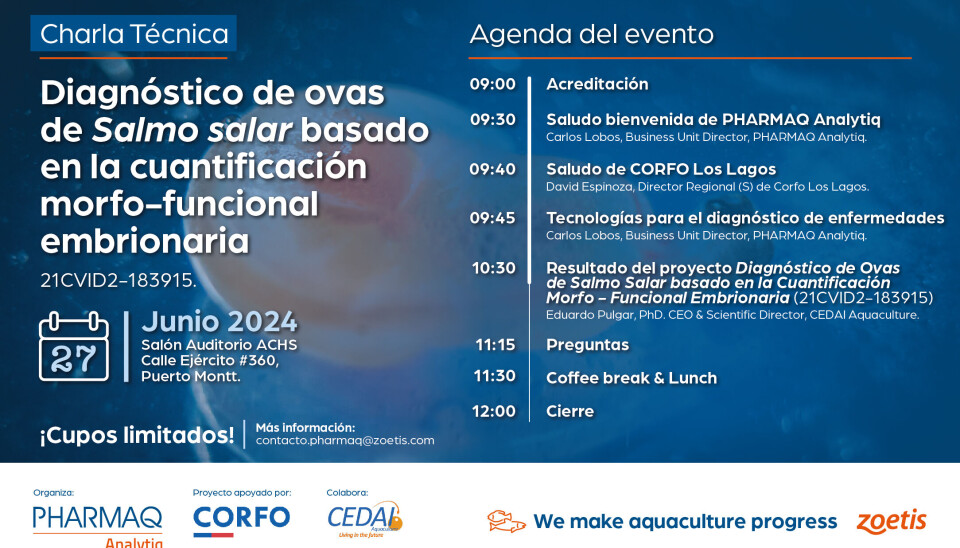
Pharmaq Analytiq develops technology to solve major salmon farming problem
The new development uses advanced algorithms and image acquisition systems, significantly improving the accuracy and anticipation of forecasts on the viability of the eggs.
Recently, Pharmaq Analytiq, part of Zoetis, completed the Corfo Crea y Valida I+D+i Empresarial Reactívate project "Diagnosis of Salmo Salar Ovas based on Morpho-Functional Embryonic Quantification (21CVID2-183915)", which began in November 2021.
As a result, the company succeeded in developing a technology for the in situ analysis of ovas (morpho-functional quantification of the embryo), which are subjected to an image acquisition system, and the data is interpreted through specific computational algorithms developed for this purpose, which have a projected accuracy of at least 85-90%.
In this way, forecasts can be made as early as 60 UTAs, with a high correlation with more advanced readings in embryonic development. Also, in embryos in the yolk sac absorption phase, it is possible to identify patterns of normality in respiratory frequency, the number of beats per minute, and rhythmicity.
Carlos Lobos, Business Unit Director of the company, explains to Salmonexpert, a media partner of LandbasedAQ, that the initiative arose because they identified that the general performance indicators in egg production had a great margin for improvement.
“Traditionally, the use and practice have defined inspection milestones to determine reproductive success, measured in the eggs through interventions that, at the time, were available. However, with technological improvements and the ability to generate more precise and robust data, much more detailed observations can be made. The measurement intervals that the industry has historically used have been based on fertilization tests, reading of spinal presence and survival to shocking, observed with the naked eye by the observer,” details Lobos.
Thus, the new technology allows these measurements to be earlier, more precise, and automated through a series of algorithms and software developed by Pharmaq Analytiq, with interpretation through artificial intelligence. In this way, observer bias is eliminated and great precision is added to the interpretation and prognosis of the productive results of the ovas and the viability of the embryos until the first feeding.
Developmental alterations

Among the most common embryonic and developmental alterations found during the development of the platform, a professional from Pharmaq Analytiq points out that they ranged from hereditary to congenital causes due to environmental and/or management conditions.
"The most frequent are usually associated with asymmetric or incomplete divisions during the first cleavages, which can trigger various subsequent anomalies. The best-known and most common alterations include microphthalmia (poor or incomplete development of the embryo's eyes), scoliosis, double axis, muscular alterations, and hypoplasias," mentions Carlos Lobos.
For fry in the yolk sac absorption phase, alterations were found in the fins, circulatory system, musculoskeletal system, and yolk sac edema.
Application to productive reality
This inspection platform will soon be available for installation in fish farms and to export the acquired images and videos to a centralized cloud. Then, a result is returned that includes the categorization of findings and the generation of a forecast.
The above will bring benefits both for egg-producing companies and buyers.
"We envision its application in egg-producing companies that seek to identify technical gaps and environmental risks associated with deformities, mortalities, reduced viability, and developmental issues. On the other hand, it allows buyers to request and validate the estimation of quality and performance in a standardized way, differentiating from manual or simple visual observations, commonly agreed with the egg and fry seller," states the Business Unit Director of the company.
Among other applications, the technology will also allow for standardized comparison of egg production campaigns in different seasons or from different genetic sources or crossbreeds, and generate records and follow-up comparisons up to the fattening stage, which will allow for better adjustments in the algorithms.

About this innovation, David Espinoza, Regional Director (S) of Corfo Los Lagos, comments that "we are excited about the results of this project and its potential to transform this reproductive aspect in the salmon industry. This technology will allow producers to maximize the quality and viability of the eggs, allowing to reduce the productive losses of embryonic biomass and ensuring a sustainable growth of this important productive sector for the region and the country".
Technical talk
The research team of Pharmaq Analytiq, together with CEDAI Aquaculture, will hold a technical talk to present this new development next Thursday, June 27, at the auditorium of the Chilean Safety Association, Puerto Montt.
For more information, please contact: contacto.pharmaq@zoetis.com



















